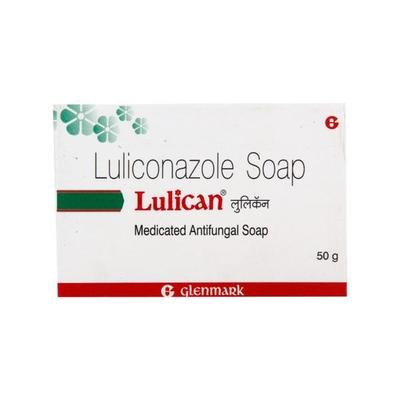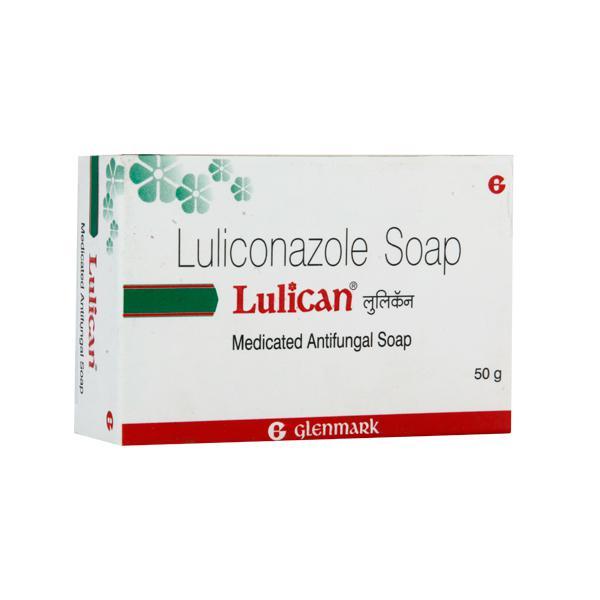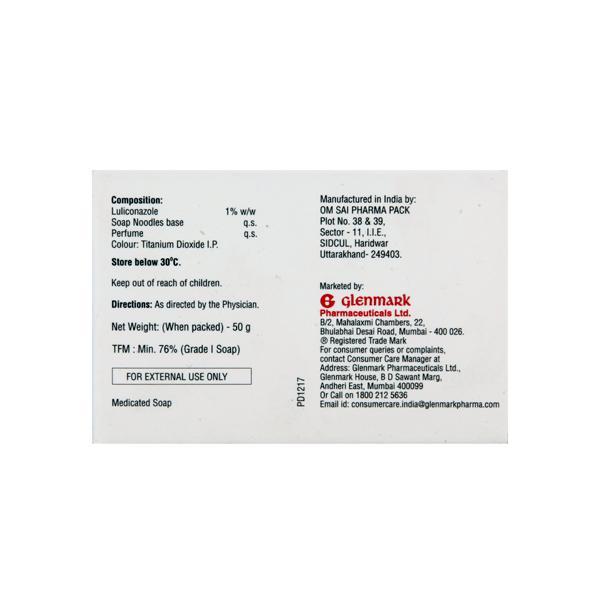

Netmeds First Membership
Quick Links
Introduction About LULICAN SOAP
LULICAN SOAP is used in the management of various fungal infections such as tinea pedis (fungal infection between the toes), tinea cruris (occurs as a red and itchy rash in the warm and moist areas of the body), and tinea corporis (ringworm fungal infection). Fungal infections can be contagious and spread from one person to another.
It contains a medicine called Luliconazole, which belongs to the group of medicines called Topical Antifungal Agents. It works by stopping the growth of the fungus causing these infections.
LULICAN SOAP is not recommended for use among women who are pregnant, and it should be used with caution in breastfeeding women unless considered necessary. This medicine is not recommended for use in children below 12 years of age unless necessary. LULICAN SOAP should be used with caution in elderly patients (aged 65 years or above).
Avoid applying LULICAN SOAP to the eyes, mouth, or vaginal region. The most common side effects of this medicine are application site reactions such as burning, irritation, itching, and redness. Contact your physician if any of the symptoms worsen.
Uses Of LULICAN SOAP
LULICAN SOAP is used to manage various fungal infections such as:
- tinea pedis (athlete's foot)
- tinea cruris (jock itch)
- tinea corporis (ringworm)
- thrush
- dry, flaky skin
How LULICAN SOAP Works
LULICAN SOAP works by causing holes in the cell membranes of the fungus (essential for the survival of the fungus as they manage the entry of unwanted substances into the cells and stop the leakage of cell contents) and killing fungi. As a result, LULICAN SOAP relieves discomfort, itching, and irritation on the skin.
How to use LULICAN SOAP
- Use this medicine as advised by your doctor.
- Wet the affected area, apply the soap, lather, and then rinse thoroughly.
- Your doctor will decide the dosage and frequency based on the intensity of the fungal infection and other relevant conditions.
- Adhere to the schedule recommended by your doctor.
Side Effects Of LULICAN SOAP
Common Side Effects of LULICAN SOAP:
- burning
- irritation
- itching
- redness
- blisters on the skin
- dry skin
- skin peeling
Stop using LULICAN SOAP and contact your doctor immediately if you experience any of the following side effects:
- allergic reaction (symptoms like skin rash, itching or hives, swelling of the face, lips, or tongue)
- increased inflammation
- redness, and pain
Warning & Precautions
Pregnancy
Monitoring requiredLULICAN SOAP is generally not recommended for use in pregnant women unless considered necessary.
Breastfeeding
Use with CautionLULICAN SOAP should be used with caution in breastfeeding women.
Allergy
ContraindicatedDo not use LULICAN SOAP if you are allergic to luliconazole or any of the other ingredients of this medicine.
Use In Pediatrics
ContraindicatedLULICAN SOAP is generally not recommended to use in children 12 years of age and below unless necessary.
Use In Geriatrics
Use with CautionLULICAN SOAP should be used with caution in elderly patients (above 65 years of age).
Interactions
Drug-Drug interactions:
Tell your doctor if you are applying or have recently taken any other medicines, including medicines obtained without a prescription, vitamin supplements, or herbal products.
Overdosage:
If you or anyone else accidentally use too much of LULICAN SOAP or if you or a child accidentally swallow the medicine, consult your doctor immediately or visit the nearby hospital.
Synopsis
| Drug | : | Luliconazole |
| Pharmacological Category | : | Topical Antifungals |
| Therapeutic Indication | : | Fungal infections |
| Dosage Forms | : | Cream, Gel, Lotion, Ointment, Spray, Soap, Dusting Powder |
More Information
FAQs About LULICAN SOAP
Q: Can I stop using LULICAN SOAP if I feel better?
A: No. LULICAN SOAP should not be stopped on your own, even if you feel better. Keep using LULICAN SOAP for as long as the doctor says. Discontinuing on your own can cause the infection to arise again. Consult your doctor immediately if the symptoms get worse or persist.
Q: How to use LULICAN SOAP?
A: Use LULICAN SOAP as advised by your doctor. Wet the affected area, apply the soap, lather, and then rinse thoroughly. Your doctor will decide the dosage and frequency based on the intensity of the fungal infection and other relevant conditions. Adhere to the schedule recommended by your doctor.
Q: How often should I use LULICAN SOAP?
A: Typically, it's used once or twice daily but follow your doctor's instructions for the best results.
Q: Can LULICAN SOAP be used on all skin types?
A: Yes, it's usually safe for various skin types, but if you have sensitive skin, check with your healthcare provider.
Q: How long will it take to see results?
A: Improvement can usually be seen within a few weeks, but complete healing might take longer depending on the infection.
Q: Is LULICAN SOAP effective against all fungal infections?
A: It's primarily effective for certain types of fungal skin infections. Consult your doctor to determine if it’s right for your specific condition.
Q: Can I use LULICAN SOAP for prevention?
A: Some people use it as a preventive measure against fungal infections, especially in high-risk areas, but always check with a healthcare provider first.
Q: When should you seek medical attention while using LULICAN SOAP?
A: Stop using LULICAN SOAP and contact your doctor immediately if you experience an allergic reaction (symptoms like skin rash, itching or hives, swelling of the face, lips, or tongue), increased inflammation, redness, and pain.
Q: How does LULICAN SOAP work?
A: LULICAN SOAP works by causing holes in the cell membranes of the fungus (essential for the survival of the fungus as they manage the entry of unwanted substances into the cells and stop the leakage of cell contents) and killing fungi. As a result, LULICAN SOAP relieves discomfort, itching, and irritation on the skin.
Q: What is the use of LULICAN SOAP?
A: LULICAN SOAP is used in the management of various fungal infections such as tinea pedis, tinea cruris, tinea corporis, thrush, ringworm, and dry and flaky skin. Please consult your physician before using LULICAN SOAP.
Q: Is LULICAN SOAP safe to use by pregnant and breastfeeding women?
A: LULICAN SOAP is not recommended for use by pregnant women. It should be used with caution in breastfeeding women unless considered necessary. Please consult your physician before using LULICAN SOAP.
Q: What are the common side effects of LULICAN SOAP?
A: The most common side effects of this medicine are application site reactions such as burning, irritation, itching, and redness. Contact your physician if any of the symptoms worsen.
Q: Who should not use LULICAN SOAP?
A: LULICAN SOAP is generally not recommended to use in children 12 years of age and below unless necessary.
References
1. P. David Rogers and Damian J. Krysan. Antifungal Agents. Goodman & Gilman’s: The Pharmacological Basics of Therapeutics. 13th Edition. New York McGraw Hill Medical 2018. Page – 1087-1104.
2. Deepshikha Khanna and Subhash Bharti. Luliconazole for the treatment of fungal infections: an evidence-based review. Journal of Core Evidence. September 2014. [Accessed on 3rd October 2024] click here
3. Manjot Kaur, Guru Nanak Dev, Kanwardeep Singh, and Subheet Kumar Jain. Luliconazole vesicular-based gel formulations for its enhanced topical delivery. Journal of Liposome Research. October 2019. [Accessed on 3rd October 2024] click here
4. Hiroyasu Koga, Yasuko Nanjoh, Koichi Makimura, Ryoji Tsuboi. In vitro antifungal activities of luliconazole, a new topical imidazole. Journal of Medical Mycology. September 2009. [Accessed on 3rd October 2024] click here
5. Harshil M. Patel, Aasma Gangat, Urvashi B. Patel, and Bhavesh Akbari. Fabrication and Characterization of Luliconazole Film-Forming Topical Spray for the Treatment of Fungal Infections. Manipal Journal of Pharmaceutical Sciences. September 2020. [Accessed on 3rd October 2024] click here
6. Sanify Healthcare Pvt. Ltd. Luliconazole. [Accessed on 3rd October 2024] click here
7. Oaknet Healthcare Limited. Luliconazole. [Accessed on 3rd October 2024] click here
8. Healing Pharma Limited. Luliconazole. [Accessed on 3rd October 2024] click here
9. Zeelab Pharmacy. Luliconazole. [Accessed on 3rd October 2024] click here
10. Leeford Healthcare Limited. Luliconazole. [Accessed on 3rd October 2024] click here
11. Medicis Pharmaceuticals. US Food and Drug Administration. [Revised in November 2013] [Accessed on 3rd October 2024] click here
User Feedback










